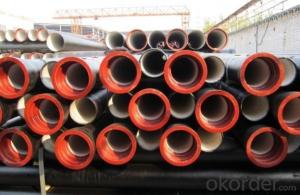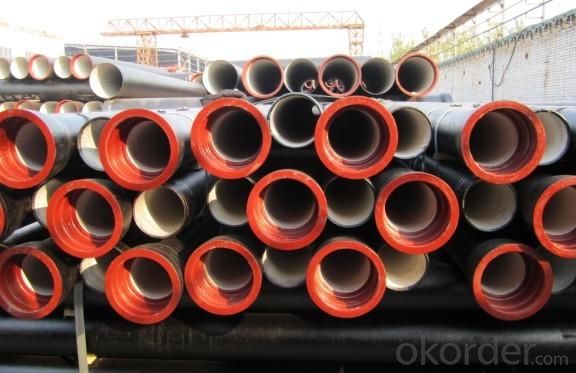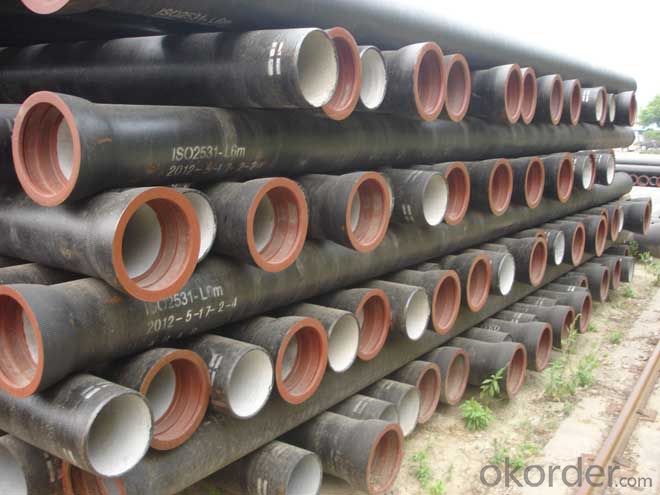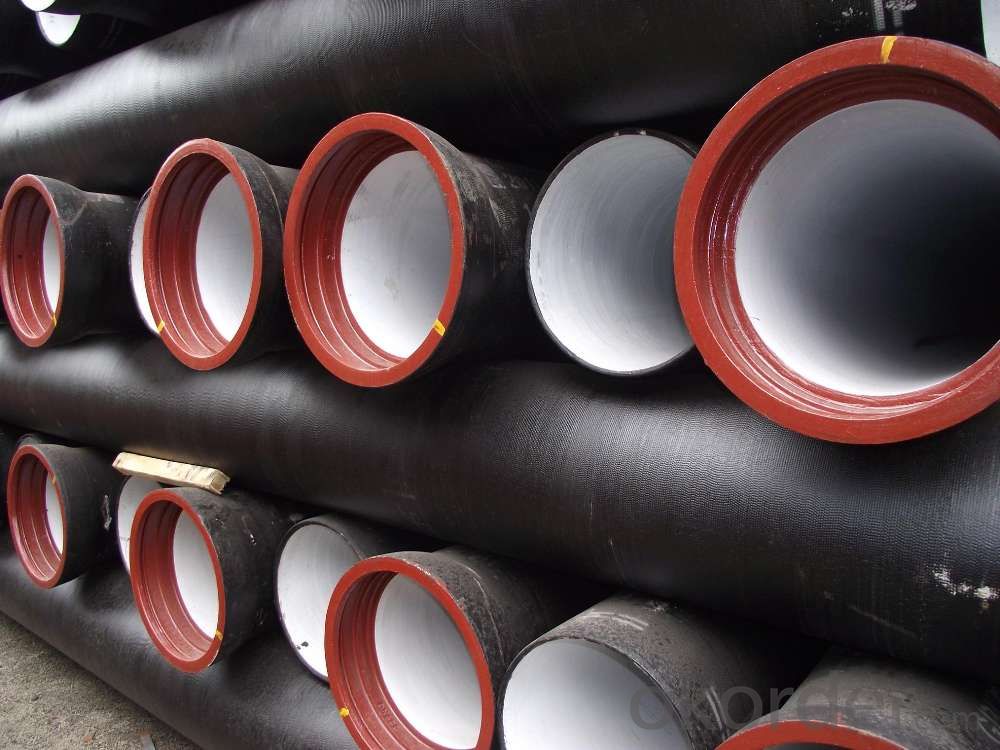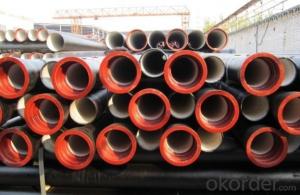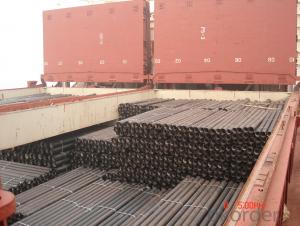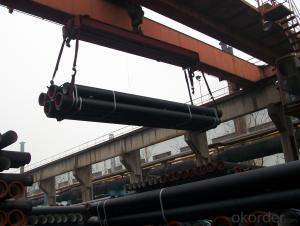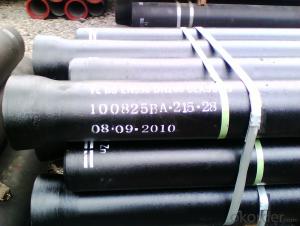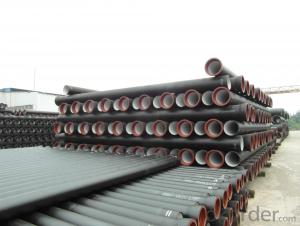Ductile Iron Pipe High Quality ISO2531:1998 DN80
- Loading Port:
- China main port
- Payment Terms:
- TT OR LC
- Min Order Qty:
- 999 m
- Supply Capability:
- 9999 m/month
OKorder Service Pledge
OKorder Financial Service
You Might Also Like
1,Ductile Iron Pipe Description :
1) Pipes confirm to ISO2531,K9 class,T type joint,6m long,with inside cements lining conform to ISO4179, outside Zinc spraying(130g/m2) and bitumen coating(70μm) conform to ISO8179.
2) Pipe ends: Spigot and socket ends, with 100% SBR rubber gaskets accoding to ISO4633
3) we can do third party inspection according to customer's request.
4) Our products have been sold to many international market, such as Middle East and South East Asia and Africa.
2,Main Features of the Ductile Iron Pipe:
•High yield strength
•High tensile Strength
•High corrosion resistance
•Pressure Resistence
•Satisfy the highest hygienic standards
3,Ductile Iron Pipe Images:
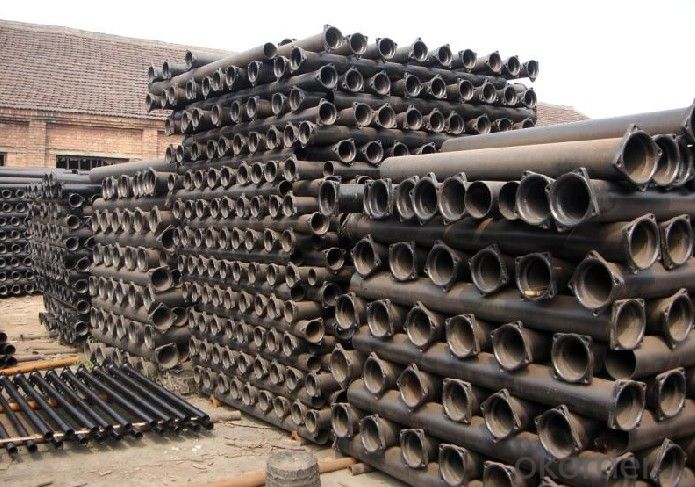
4.FAQ:
We have organized several common questions for our clients,may help you sincerely:
Q: Why would you choose ductile iron pipe rather than other pipe materials?
A:The reasons are obvious for that not only ductile iron pipe possesses the inherent strength and flexibility of ductile iron, combined with proven corrosion protection systems, but also the cost savings can be achieved from design to installation and commissioning.
Q:Why can you guarantee the inner of pipes can’t be corroded?
A: High alumina cement mortar lining and sulphate-resistant cement mortar lining. These two special linings are applicable to inner anti-corrosion for sewage pipes, improving resistance to erosion of the sewage components.
- Q: What is cast iron pipe, specification for cast iron pipe?
- Ductile iron pipes are more expensive, but the production methods are different.
- Q: It's not easy to drill ductile iron with cobalt high speed steel bit. Please help to point it out
- Choose carbide or whole carbide drill, about 90HRC in hardness. But it requires a high number of drills, around 3000.
- Q: How are ductile iron pipes protected against freeze-thaw cycles?
- Ductile iron pipes are protected against freeze-thaw cycles through several measures. Firstly, the material used in ductile iron pipes is inherently resistant to low temperatures and can withstand freezing conditions without becoming brittle or prone to cracking. Additionally, the pipes are often coated with a protective layer, such as cement mortar lining or polyethylene encasement, to provide an extra barrier against freeze-thaw damage. These coatings serve to insulate the pipe and prevent direct contact between the iron and the surrounding environment. Furthermore, ductile iron pipes are commonly designed with joints that allow for movement and flexibility, which helps to accommodate any expansion or contraction that may occur during freeze-thaw cycles. This flexibility reduces the risk of pipe breakage or damage due to the pressure exerted by freezing water inside the pipe. Moreover, proper installation practices, including adequate bedding and backfilling, are crucial in protecting ductile iron pipes against freeze-thaw cycles. Ensuring that the pipes are properly supported and surrounded by suitable materials helps to minimize the impact of freezing temperatures on the structural integrity of the pipes. Regular inspection and maintenance of ductile iron pipes are also essential in identifying any potential issues caused by freeze-thaw cycles. Periodic assessments can help detect any signs of damage or deterioration, enabling timely repairs or replacement to prevent further damage. In summary, ductile iron pipes are protected against freeze-thaw cycles through the inherent resistance of the material, protective coatings, flexible joints, proper installation practices, and regular maintenance. These measures collectively contribute to the durability and longevity of ductile iron pipes, even in cold weather conditions.
- Q: Can ductile iron pipes be used for underground parking lot drainage?
- Yes, ductile iron pipes can be used for underground parking lot drainage. Ductile iron is a strong and durable material that is commonly used for underground piping systems. It has excellent resistance to corrosion, making it suitable for applications where the pipes will be exposed to moisture and water. Additionally, ductile iron pipes have high tensile strength, which allows them to handle heavy loads and withstand the pressure exerted by vehicles in a parking lot. Therefore, using ductile iron pipes for underground parking lot drainage is a reliable and long-lasting solution.
- Q: Can ductile iron pipe be used for nuclear power plants?
- Yes, ductile iron pipe can be used for certain applications in nuclear power plants, particularly in non-safety-related systems such as cooling water, fire protection, or ancillary service pipelines. However, for safety-related systems that involve high-pressure or high-temperature conditions, materials with higher performance characteristics such as stainless steel or alloy materials are typically preferred.
- Q: A tube is used only in ductile iron pipes, isn't it?
- Compared with the PE pipe, from the installation time, ductile pipe PE pipe installation is simple and rapid, and after the installation of internal and external pressure bearing better tightness and corrosion resistance; from the point of view, ductile pipe sealing better after installation, but also can improve the corrosion resistance of corrosion protection through a variety of means; from the hydraulic performance, because ductile pipe specifications generally refers to the inner diameter of PE pipe diameter specifications generally refers to the same specifications, because under the condition of ductile pipe can achieve greater runoff; from the installation and maintenance cost, ductile pipe have more favorable price. The main components of ductile iron pipes are carbon, silicon, manganese, sulfur, phosphorus and magnesium. The inner wall of zinc spray, anti-corrosion materials such as cement mortar.
- Q: What is the average weight of ductile iron pipe?
- The average weight of ductile iron pipe can vary depending on its size and thickness. Generally, ductile iron pipe ranges in weight from approximately 3.5 pounds per foot for smaller diameters to over 20 pounds per foot for larger diameters. It is important to note that these weights are approximate averages and can vary slightly based on specific manufacturers and pipe specifications.
- Q: Can ductile iron pipe be used for stormwater systems?
- Yes, ductile iron pipe can be used for stormwater systems. It is a suitable material choice due to its strength, durability, and resistance to corrosion, making it capable of withstanding the demands of stormwater drainage systems.
- Q: What does ductile iron pipe "ND200" mean?
- Generally speaking, the diameter of the pipe can be divided into outer diameter, inner diameter and nominal diameter. The pipe is a seamless steel pipe pipe diameter by the letter D to represent, then additional outer diameter size and thickness, such as diameter of seamless steel pipe 108, a wall thickness of 5MM, denoted by D108*5, is also used outside said, such as De63 plastic pipe, such as reinforced concrete pipe, cast iron pipe, galvanized steel pipe, said the DN, in the design drawings is generally used to represent the nominal diameter, nominal diameter is a standard in order to design and manufacture and maintenance convenient set artificially, with nominal diameter, tube (or pipe) specification name.
- Q: Are there any specific standards or regulations for ductile iron pipe?
- Ductile iron pipe is subject to specific standards and regulations. It is widely used in water and wastewater systems due to its strength and durability. The American Water Works Association (AWWA) C151 standard is the most well-known standard for ductile iron pipe. This standard outlines the minimum requirements for ductile iron pipe, including materials, dimensions, tolerances, and testing methods. It also provides guidance on the manufacturing, installation, and maintenance of ductile iron pipe systems. Apart from the AWWA C151 standard, there are other standards and regulations that govern the use of ductile iron pipe in different countries. In Europe, for instance, ductile iron pipe is regulated by the EN 545 and EN 598 standards. These standards specify the requirements for ductile iron pipes and fittings used in water supply and wastewater systems. Additionally, government agencies like the Environmental Protection Agency (EPA) in the United States may have specific regulations and guidelines for using ductile iron pipe in certain applications, such as drinking water systems. Manufacturers, contractors, and engineers involved in the design, installation, and maintenance of ductile iron pipe systems must ensure compliance with these standards and regulations. This is crucial to guarantee that ductile iron pipe is manufactured to the highest quality standards and that it is installed and maintained correctly, ensuring its durability and reliability in water and wastewater systems.
Send your message to us
Ductile Iron Pipe High Quality ISO2531:1998 DN80
- Loading Port:
- China main port
- Payment Terms:
- TT OR LC
- Min Order Qty:
- 999 m
- Supply Capability:
- 9999 m/month
OKorder Service Pledge
OKorder Financial Service
Similar products
Hot products
Hot Searches
Related keywords
